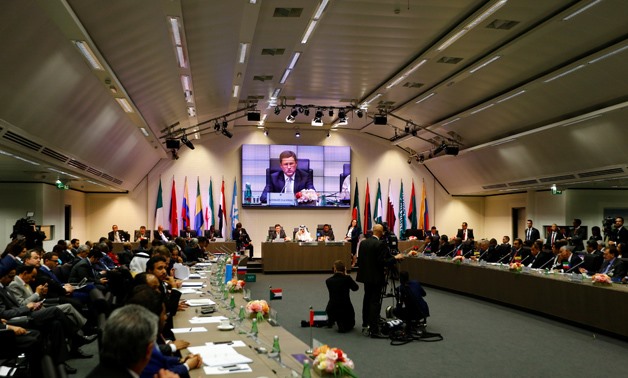
Russia's Energy Minister Alexander Novak, Saudi Arabia's Energy Minister and OPEC conference president Khalid al-Falih, and OPEC Secretary (OPEC) REUTERS/Leonhard Foeger
Vienna, May 25, 2017 (AFP) - Saudi Arabia's energy minister said Thursday he was confident that an expected extension of output cuts by major oil producers will ease a global crude glut, despite fears US rivals will spoil the party.
"The market in my opinion is on its way to recovery. The drawdown of inventories has clearly begun and I expect this trend to accelerate," Khaled al-Falih said at the start of a meeting of 24 countries at OPEC headquarters in Vienna.
Late last year the Organization of the Petroleum Exporting Countries and 11 other nations including Russia agreed to cut production by 1.8 million barrels per day.
The aim was to reduce the massive oil inventories that had helped push down the price of oil from over $100 per barrel in 2014 to close to $25 in early 2016.
While low prices were welcome news to firms and to consumers filling up their cars, this blew a hole in the finances of oil-producing nations, even rich Gulf countries, to say nothing of stricken Venezuela.
Since December Brent crude, the global benchmark, has recovered to more than $53 per barrel from about $46, although it has dipped below $50 several times.
The pact, a dramatic policy turnaround for OPEC that even had regional arch rivals Saudi Arabia and Iran see eye to eye, is due to expire on June 30.
Last week Saudi Arabia and non-OPEC Russia, the biggest of the 24 -- and who also are anything but best friends -- backed an extension until April 2018.
On Wednesday a joint committee of OPEC and non-OPEC nations recommended such a nine-month rollover. Thursday's meeting was expected to sign off on this.
Falih, the Saudi energy minister, told reporters that he expected this to "do the trick" of reducing inventories to their five-year average by the first quarter of next year.
Previously, OPEC's strategy was to keep pumping at full tilt in order to flood the market and make life difficult for the Americans, who need a higher price to make money.
This pushed scores of US firms out of business. But with the recent rise, many have returned to the market with a vengeance, and output is nearing record levels.
Despite the slow reduction of the global glut, as well as the prospect of rising output from Libya and Nigeria, Falih said that he was not worried.
"Shale is a important variable but we don't believe it is going to significantly derail or affect what we are doing," he said.
But the market was disappointed that there is no sign that the oil producers are considering steeper cuts to output.
Chris Beauchamp, market analyst at online trading firm IG, called Falih's belief that greater reductions are not needed "quaint".
Alexandre Andlauer from equity research firm Alphavalue called OPEC's strategy "old-fashioned".
Earlier the price of Brent plunged $2 per barrel but later recovered. By 1440 GMT, it was down 44 cents at $53.52 while West Texas Intermediate was off 48 cents at $50.86.
Iran's Oil Minister Bijan Zanganeh said that the "goal" at the moment was a price of $55-60 per barrel, saying this was "good for both" shale and conventional producers.


Comments
Leave a Comment